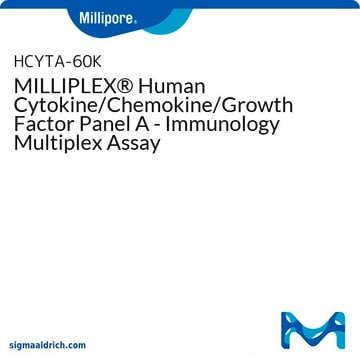HIL18MAG-66K
MILLIPLEX® Human IL-18 Singleplex Magnetic Bead Kit
Synonym(s):
Magnetic bead assay
Sign Into View Organizational & Contract Pricing
All Photos(1)
About This Item
UNSPSC Code:
12161503
NACRES:
NA.84
Recommended Products
General description
“Cytokine” is a general term used for a diverse group of soluble proteins and peptides which act as regulators under both normal and pathological conditions to modulate the functional activities of individual cells and tissues. These proteins also mediate direct interactions between cells and regulate processes taking place in the extracellular environment. Cytokines differ from hormones in that they act on a wider spectrum of target cells. Also, unlike hormones, they are not produced by specialized cells which are organized in specialized glands. The cytokine group of proteins includes lymphokines, interferons, colony stimulating factors and chemokines. Cytokine and chemokine research plays a significant role in achieving a deeper understanding of the immune system and its multi-faceted response to most antigens, as well as disease states such as inflammatory disease, allergic reactions, irritable bowel disease (IBD), sepsis, and cancer.
The MILLIPLEX® Human IL-18 Singleplex enables you to focus on the therapeutic potential of IL-18 as well as the modulation of IL-18 expression.
The Luminex® xMAP® platform uses a magnetic bead immunoassay format for ideal speed and sensitivity to quantitate multiple analytes simultaneously, dramatically improving productivity while conserving valuable sample volume.
Panel Type: Cytokines/Chemokines
The MILLIPLEX® Human IL-18 Singleplex enables you to focus on the therapeutic potential of IL-18 as well as the modulation of IL-18 expression.
The Luminex® xMAP® platform uses a magnetic bead immunoassay format for ideal speed and sensitivity to quantitate multiple analytes simultaneously, dramatically improving productivity while conserving valuable sample volume.
Panel Type: Cytokines/Chemokines
Application
- Analyte: IL-18
- Recommended Sample type: Serum, plasma, tissue culture supernatant
- Recommended Sample dilution: Neat serum and plasma. Tissue culture supernatant may require a dilution with an appropriate control medium prior to assay.
- Assay Run Time: Overnight or two-hour primary incubation. For best results, an overnight incubation is recommended.
- Research Category: Inflammation & Immunology
- Research Subcategory: Obesity, Metabolic Disorders, Inflammation & Autoimmune Mechanisms
Legal Information
Luminex is a registered trademark of Luminex Corp
MILLIPLEX is a registered trademark of Merck KGaA, Darmstadt, Germany
xMAP is a registered trademark of Luminex Corp
Signal Word
Danger
Hazard Statements
Precautionary Statements
Hazard Classifications
Acute Tox. 4 Dermal - Acute Tox. 4 Inhalation - Acute Tox. 4 Oral - Aquatic Chronic 2 - Eye Dam. 1 - Skin Sens. 1 - STOT RE 2
Target Organs
Respiratory Tract
Storage Class Code
10 - Combustible liquids
Certificates of Analysis (COA)
Search for Certificates of Analysis (COA) by entering the products Lot/Batch Number. Lot and Batch Numbers can be found on a product’s label following the words ‘Lot’ or ‘Batch’.
Already Own This Product?
Find documentation for the products that you have recently purchased in the Document Library.
Gyoung Nyoun Kim et al.
PLoS pathogens, 17(12), e1010092-e1010092 (2021-12-17)
The development of safe and effective vaccines to prevent SARS-CoV-2 infections remains an urgent priority worldwide. We have used a recombinant vesicular stomatitis virus (rVSV)-based prime-boost immunization strategy to develop an effective COVID-19 vaccine candidate. We have constructed VSV genomes
Devalingam Mahalingam et al.
Clinical cancer research : an official journal of the American Association for Cancer Research, 26(1), 71-81 (2019-11-07)
Pelareorep is an intravenously delivered oncolytic reovirus that can induce a T-cell-inflamed phenotype in pancreatic ductal adenocarcinoma (PDAC). Tumor tissues from patients treated with pelareorep have shown reovirus replication, T-cell infiltration, and upregulation of PD-L1. We hypothesized that pelareorep in
Chuanhai Cao et al.
Frontiers in aging neuroscience, 14, 829049-829049 (2022-05-20)
The immune system plays a critical role in the development and progression of Alzheimer's disease (AD). However, there is disagreement as to whether development/progression of AD involves an over-activation or an under-activation of the immune system. In either scenario, the
Our team of scientists has experience in all areas of research including Life Science, Material Science, Chemical Synthesis, Chromatography, Analytical and many others.
Contact Technical Service









